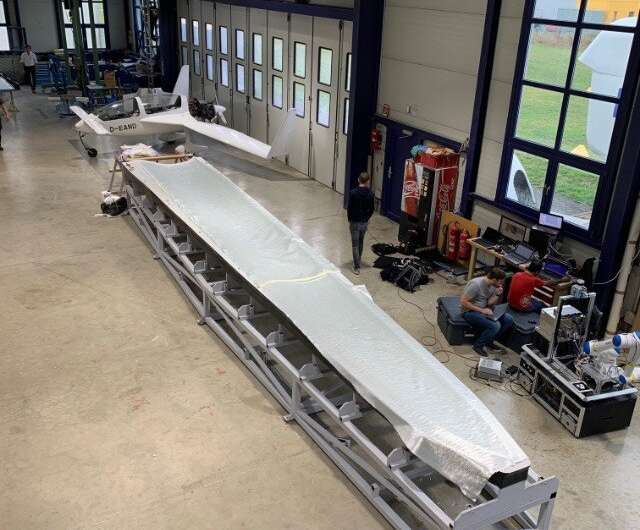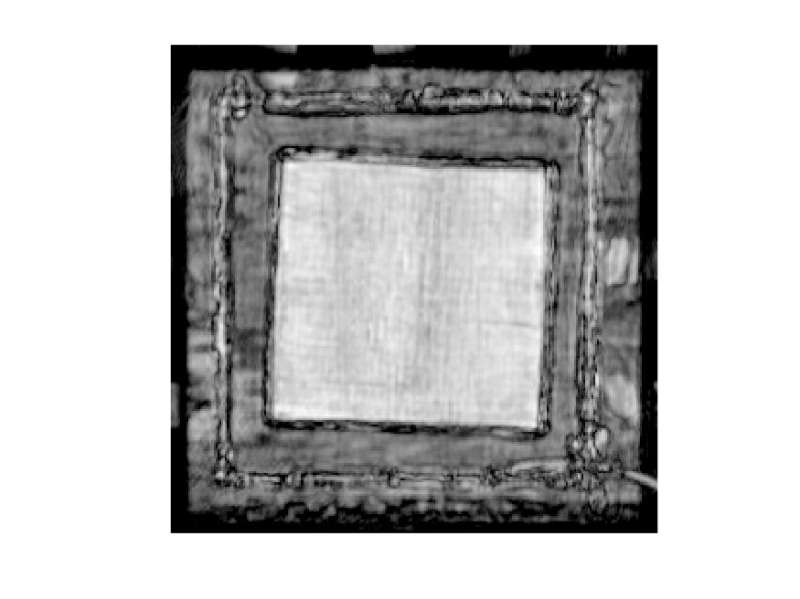A novel radar technique automatically monitors rotor blade manufacturing processes

Identifying defects in fiber composite materials during the production process will be possible in the future thanks to a novel radar method that automatically and non-destructively monitors the manufacturing process of fiber composite materials such as wind turbine rotor blades. Until now, monitoring has consisted of visual inspections. The Fraunhofer Institute for High Frequency Physics and Radar Techniques FHR collaborated with consortium partners Ruhr University Bochum, FH Aachen University of Applied Sciences and Aeroconcept GmbH to develop an innovative method in the FiberRadar project.
During the manufacturing process of glass fiber reinforced structural components, such as those found in rotor blades, the fiber structure is fixed with a resin matrix. Irregularities in the alignment and/or the flow of fiber reinforcement can alter the structural properties and as a result reduce the quality of the final composite material.
“When producing rotor blades, layers of glass fibers are layered on top of each other in a shell. If this is not done accurately, it can lead to various defects such as undulation. But the fiber can also become twisted and therefore impact the mechanical properties of the component,” explains Dr. André Froehly, project manager at Fraunhofer FHR in Wachtberg.
It has so far not been possible to reliably analyze the direction and layering of the fibers before the resin matrix is applied, meaning that defects were only discovered afterwards, for instance via ultrasound examination. This made it impossible to control the process chain and resulted in costly rework or sometimes even the scrapping of components.

Great potential for producing composites
Researchers involved in the FiberRadar project have now developed a new method that, for the first time, allows for checking the alignment of the lower glass fiber layers in a non-destructive and automated manner. The process uses a millimeter-wave scanning system consisting of a radar, a fully polarimetric robot and associated imaging software. The system also harnesses the polarization of the electromagnetic waves, so it can also identify possible defects through a variation in the direction of polarization.
Polarization is a term used in antenna technology to denote the direction of the electric field component of an electromagnetic wave. The robot scans the component, and at each position the radar performs a measurement. These are then combined into a 3D image by the software. The special feature: While conventional radars only have one channel and therefore use one polarization for both transmitting and receiving, the new radar sends and receives signals in two polarizations. This not only provides high-resolution fiber structure imaging, but also makes it easy to expose any defects in the deeper layers.
Additionally, refraction compensation improves the quality of the images: It reduces unwanted effects due to refraction, especially in deeper layers. By using radar to scan the individual layers, researchers can also identify any anomalies in fiber orientation and examine the entire material volume in a non-destructive manner.
The FiberRadar project combined Ruhr University’s integrated radar technology, Fraunhofer FHR’s algorithm expertise and FH Aachen’s expertise in robotics to create a measurement system that enables the production of fiber composite materials and the control of the manufactured components with levels of precision that were previously not possible. Thanks to Aeroconcept GmbH’s experience, the technology can be integrated directly into the manufacturing and monitoring process for wind turbine blade production and become a key technology for high-quality composites.
“We are very pleased with the promising results marking the end of the FiberRadar project,” says André Froehly. “We plan to use follow-up projects to further develop the system so that it is ready for use in production processes. We are aiming to improve both the speed and the depth resolution to detect even more potential defects in a shorter period of time.”
Citation:
A novel radar technique automatically monitors rotor blade manufacturing processes (2023, March 1)
retrieved 1 March 2023
from https://techxplore.com/news/2023-03-radar-technique-automatically-rotor-blade.html
This document is subject to copyright. Apart from any fair dealing for the purpose of private study or research, no
part may be reproduced without the written permission. The content is provided for information purposes only.
For all the latest Technology News Click Here
For the latest news and updates, follow us on Google News.

